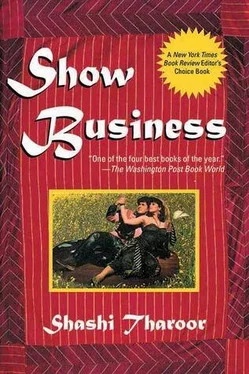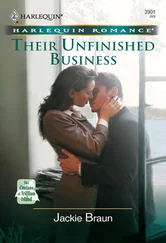Our hero looks at the girl on the stage, the girl on the stage looks at him, the camera looks at her looking at him, the camera looks at him, too. He leans against the bar, his face framed by a fuzzy background of bottles. The girl swings into song:
Baby don’t leave me —
You’ve got to believe me,
I love you!
Baby don’t leave me —
Tell me you believe me,
That I love you …
Her hips twist improbably; her mikeless hand, five fingers spread, traces a vivid diagonal across her torso from thigh upward, stopping only at the natural obstruction above. She tosses shoulder-length hair and croons:
I’m the kind of woman who takes a lot of loving,
And to get it I may do some shoving,
I know I’ve been bad
But it makes me sad
To think you don’t want me anymore.
Pranay joins her in the chorus:
Baby don’t leave me —
You’ve got to believe me,
I love you!
Baby don’t leave me —
Tell me you believe me,
That I love you …
Ashok smiles impassively. The girl is looking at him as she continues:
You’re the kind of man I want to cling to,
You’re the only man I want to sing to,
I’ll put all my charms
Into your arms
Don’t tell me you don’t want me anymore.
Pranay looks at her, looks at Ashok, then smashes the cymbals attached to his drum set as he joins in:
Baby don’t leave me —
You’ve got to believe me,
I love you!
Baby don’t leave me —
Tell me you believe me, That
I love you …
Ashok is nodding to the music now, his smile as anodyne as the indeterminable contents of the blurred bottles behind him. Abha, knees bent and leaning backward, vigorously shakes her twin assets, like a camel removing extra drops of water after a dip in an oasis. She sings on:
For you I’ll do just anything,
I want to hold you and wear your ring,
I need to kiss you
Can’t bear to miss you
Don’t say you don’t want me anymore.
Pranay, looking at her, smashes his drumstick into the palm of his hand out of sheer force of habit. His pain is drowned in the chorus:
Baby don’t leave me —
You’ve got to believe me,
I love you!
Baby don’t leave me —
Tell me you believe me, That
I love you …
The Junior Artistes, plates comprehensively neglected, break into thunderous and synchronized applause.
Exterior: later that night. Ashok steps out of the nightclub. He stands on the stoop, pulls out a cigarette, places it in his mouth. (Smoking does not trouble the rural moralists.) A match flares: his manly profile is lit up as he bends to light the weed.
Suddenly he hears sounds. A woman’s voice, raised: “Let me go!” His head cocked, he listens. Then he shakes out the match and steps determinedly into the shadows.
Abha is trying to pull herself away from Pranay, who is tugging at her arm. “Let me go!” she snaps-pleads, outraged virtue combining with panic in her voice. “No,” he snarls, and the audience can almost smell the whiskey on his breath. “You’re coming with me tonight.”
Ashok emerges from the shadows. “Let the lady go,” he says, his voice calm, strong, tough (after three attempts in the dubbing studio).
“Huh?” Pranay turns bloodshot eyes on the intruder. “And who the hell are you to tell me what to do?” He pulls a grimacing Abha closer.
“Never mind who I am,” replies Ashok in the same tone of voice. “I don’t like repeating myself. Let the lady go.”
Pranay scowls. “Try and make me,” he says, spitting to one side. He has Abha in his clutches now, leaving only one hand free. Abha struggles (but not too hard).
“As you like.” Ashok resignedly slips off his tuxedo jacket, hangs it on the broken branch of a convenient tree. Then, while Pranay is still regarding this process in surprise, he moves forward in a quicksilver maneuver, socks the villain in the solar plexus, wrenches one arm around and liberates Abha. Before Pranay can recover, Ashok has gently moved Abha out of harm’s way. The villain’s fist comes flying at him; Ashok steps deftly aside, catches Pranay’s wrist, and brings him crashing to the ground. The villain shakes his head, staggers to his feet, charges our hero. But without his whip Pranay is not half the man we have seen at Godambo’s. Ashok administers a swift lesson in elementary fisticuffs, and Pranay bites the dust. Quite literally: some of the dust gets into his mouth, and he lies there, coughing.
“Get lost,” Ashok amiably tells the sprawled villain, as an anxious Abha cowers and hovers behind him. “Or I might really get angry.” Pranay takes the advice and, with one backward glance, stumbles away into the night, still coughing.
“Oh, thank you,” breathes a grateful Abha. “You saved my life.”
“It was nothing,” Ashok responds modestly. “Let me take you home.”
“Thank you,” she agrees huskily. “It’s only a short walk from here, but I’d feel so much safer with you.”
They walk. He tells her she sang very well. She tells him he fought very well. He asks her how she became a singer. “Majboori” she says, a catch in her voice: compulsion. She had no choice. She had wanted nothing more than to finish her studies and lead a normal life, marry someone chosen by her parents, start a family. But her father fell into the hands of bad men. He drank, he gambled, he ran up debts. Her mother wept and told him there was no money for their daughter’s school fees, but he would not listen. One day the bad men came and asked for the money. Her father had nothing to give. The men ransacked the house, opened drawers, smashed mirrors, overturned tables, beat her father. But they found nothing of value. “What about your daughter?” asked their leader, an evil man with a narrow red-stained mouth and a drooping mustache. “We hear she can sing. Well, she can sing for the money.” Despite her mothers tearful protests, her father agreed. They dragged her away. This was several months ago. She had been singing for them ever since.
“What if you stop? Refuse to go on?” Ashok asks, as the studio stars twinkle overhead, casting slivers of light on the teardrop that trembles on her cheek. “They will kill me.” She shivers. “Or my parents. They said they would burn down my parents’ house if I even thought of—” Her voice chokes.
Ashok puts an arm around her, delicately wipes the tear off her cheek with his long fingers. “Don’t worry,” he says, “I’ll look after you.” She smiles, nestles closer to him. For some reason they are walking by the beach now. Moonbeams play with her hair and shine on her pearly smile, as he introduces himself with the theme song:
I am the long arm of the law,
I’ll always show villains the door
By day or by night
I’ll handle any fight
And put all the bad men on the floor!
As the song continues, the scene keeps changing to depict their evolving courtship. In one verse they are by the beach; in the next, running through a park; in a third, swaying on his motorcycle. Through each change of costume and locale, the song goes on:
I am the long arm of the law,
You needn’t ask for any more,
No one will hurt you, Nothing can
dirt you, You are what I’m fighting for!
Читать дальше












